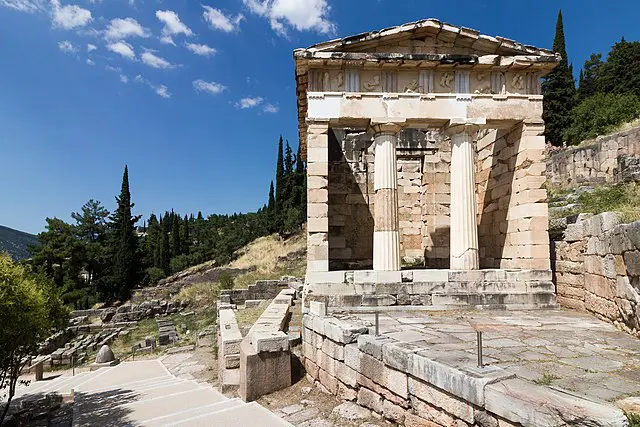Ἱστορίαι Ἡροδότου — ιδ’
Herodotus’ Histories — #14
May 2021
Treasury house of Athens in Delphi — Szymon Kabalczyk

After Gyges’ taking power, he appears to have been rather generous with Delphi and sent a large amount of offerings there. These are described in detail in the following chapter. The picture at the top is where these offerings would have been at the time.
Τὴν μὲν δὴ τυραννίδα οὕτω ἔσχον οἱ Μερμνάδαι τοὺς Ἡρακλείδας ἀπελόμενοι, Γύγης δὲ τυραννεύσας ἀπέπεμψε ἀναθήματα ἐς Δελφοὺς οὐκ ὀλίγα, ἀλλʼ ὅσα μὲν ἀργύρου ἀναθήματα, ἔστι οἱ πλεῖστα ἐν Δελφοῖσι, πάρεξ δὲ τοῦ ἀργύρου χρυσὸν ἄπλετον ἀνέθηκε ἄλλον τε καὶ τοῦ μάλιστα μνήμην ἄξιον ἔχειν ἐστί, κρητῆρες οἱ ἀριθμὸν ἓξ χρύσεοι ἀνακέαται.
ἑστᾶσι δὲ οὗτοι ἐν τῷ Κορινθίων θησαυρῷ, σταθμὸν ἔχοντες τριήκοντα τάλαντα· ἀληθέι δὲ λόγῳ χρεωμένῳ οὐ Κορινθίων τοῦ δημοσίου ἐστὶ ὁ θησαυρός, ἀλλὰ Κυψέλου τοῦ Ἠετίωνος. οὗτος δὲ ὁ Γύγης πρῶτος βαρβάρων τῶν ἡμεῖς ἴδμεν ἐς Δελφοὺς ἀνέθηκε ἀναθήματα μετὰ Μίδην τὸν Γορδίεω Φρυγίης βασιλέα.
ἀνέθηκε γὰρ δὴ καὶ Μίδης τὸν βασιλήιον θρόνον ἐς τὸν προκατίζων ἐδίκαζε, ἐόντα ἀξιοθέητον· κεῖται δὲ ὁ θρόνος οὗτος ἔνθα περ οἱ τοῦ Γύγεω κρητῆρες. ὁ δὲ χρυσός οὗτος καὶ ὁ ἄργυρος τὸν ὁ Γύγης ἀνέθηκε, ὑπὸ Δελφῶν καλέεται Γυγάδας ἐπὶ τοῦ ἀναθέντος ἐπωνυμίην.
Tēn men dē tyrannida houtō eschon hoi Mermnadai tous Hērakleidas apelomenoi, Gygēs de tyranneusas apepempse anathēmata es Delphous ouk oliga, allʼ hosa men argyrou anathēmata, esti hoi pleista en Delphoisi, parex de tou argyrou chryson apleton anethēke allon te kai tou malista mnēmēn axion echein esti, krētēres hoi arithmon hex chryseoi anakeatai.
hestasi de houtoi en tō Korinthiōn thēsaurō, stathmon echontes triēkonta talanta; alēthei de logō chreōmenō ou Korinthiōn tou dēmosiou esti ho thēsauros, alla Kypselou tou Ēetiōnos. houtos de ho Gygēs prōtos barbarōn tōn hēmeis idmen es Delphous anethēke anathēmata meta Midēn ton Gordieō Phrygiēs basilea.
anethēke gar dē kai Midēs ton basilēion thronon es ton prokatizōn edikaze, eonta axiotheēton; keitai de ho thronos houtos entha per hoi tou Gygeō krētēres. ho de chrysos houtos kai ho argyros ton ho Gygēs anethēke, hypo Delphōn kaleetai Gygadas epi tou anathentos epōnymiēn.
And in this way, the Mermnadae received the rule by taking it from the Heraclids; and during Gyges’ reign, he sent a not unsignificant amount of offerings consisting of silver (coins) to Delphi — the majority of which remain there. Aside from the silver, some other offerings of his that are worth mentioning are an immense amount of gold and six golden wine jugs, dedicated by him to Delphi.
These stood in the Treasury of Delphi, having a combined weight of thirty talents (roughly 790 kg / 1740 lbs). To tell you the truth, the Treasury does not belong to the people of Corinth themselves, but rather to Cypselus of Eetion (Corinthianruler of the 7th century BC). This Gyges was the first of the barbarians of whom we know, who placed offerings at Delphi; at least after Midas, the son of Gordia and king of Phrygia.
This Midas placed the royal throne on which he sat and passed judgement, an item well worth seeing. The throne stands in the same place where Gyges’ wine jugs stand. The silver and gold, which Gyges dedicated to Delphi, is called Gygean
by the Delphians, after the person who dedicated it.